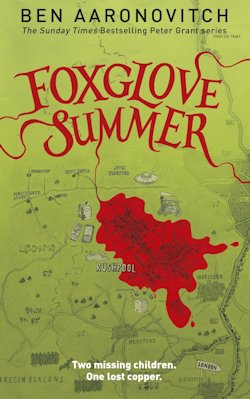Foxglove Summer is the fifth instalment in Ben Aaronovitch’s Peter Grant series, about a junior London copper who finds himself apprentice to the only wizard still active on the force.
Foxglove Summer doesn’t answer the question posed by the end of Broken Homes. It steps away from the whole issue of the Faceless Man and the ongoing arc for a bit of a procedural ramble in the countryside. Two eleven-year-old girls have gone missing in rural Herefordshire, near Leominster. Inspector Nightingale sends Peter out on a routine check to make sure that the ancient, retired former wizard who’s made his home nearby has nothing to do with it. Mere routine: but Peter can’t keep his nose out of other people’s business, and when he finds nothing immediately to raise his hackles, he volunteers his services to the local police forces instead of returning to London.
Contains spoilers.
It turns out that there is something up Peter’s alley of weirdness going on in Herefordshire. He can’t quite put his finger on what, but with two children missing, figuring it out is a matter of not insignificant urgency. Joined by his lover Beverly Brook, the goddess of a small London river, it’s up to Peter to piece together what a missing child’s invisible friend, dead sheep, and a woodland area where weird things happen, have to do with each other, and with the crime at hand.
Among Aaronovitch’s flaws as a writer in this series include a tendency to support the narrator’s male gaze, and a love affair with the acronyms and abbreviations of English policing. But his ability to construct a fast, tense, readable police procedural (with magic) is inarguable. The combination—and frequently, the clash—of modern policing methods with magic and folklore remains a compelling juxtaposition, one that’s funny more often than not. As the narrative acknowledges, most of the police officers that Peter’s working alongside want a “rational explanation” for the weird shit—but in Peter’s world, sometimes the rational explanation is “a wizard did it.” The intrusion of magic keeps the procedural elements from coming too close to the formulaic: among the witness statements and physical evidence, the presence of carnivorous unicorns and beings that only become visible in moonlight keeps matters from ever quite reaching predictability.
Peter’s voice remains compelling. It’s one of the most appealing things about this series. In removing him from his usual stomping grounds to the countryside, Aaronovitch takes the opportunity to cast a minor side-eye at the white uniformity and unthinking assumptions of part of Britain: as a mixed-race lad from London, Peter sticks out in Leominster.
And yet, much as I enjoyed Foxglove Summer, it marks a definite retreat in terms of tension and stakes from the two instalments directly previous. It’s not just the absence of Lesley May, whose presence in the narrative provided a foil and a balance for Peter that is not, here, really achieved by Beverly and local copper Dominic—or the absence of firm answers to the question of what was she thinking, really? Foxglove Summer doesn’t advance a series arc, or provide Peter with opportunities for growth as a character, or even give the reader opportunities to see character or world in a new light. It’s not in the least ambitious, and in many ways it feels like it’s marking time. It’s amusing. It’s diverting. It’s fun—but its goals are, ultimately, rather limited.
Within those limits, it’s a good book.
Foxglove Summer is available November 13th in the UK (Gollancz) and January 6th in the US (DAW).
Liz Bourke is a cranky person who reads books. Her blog. Her Twitter.










